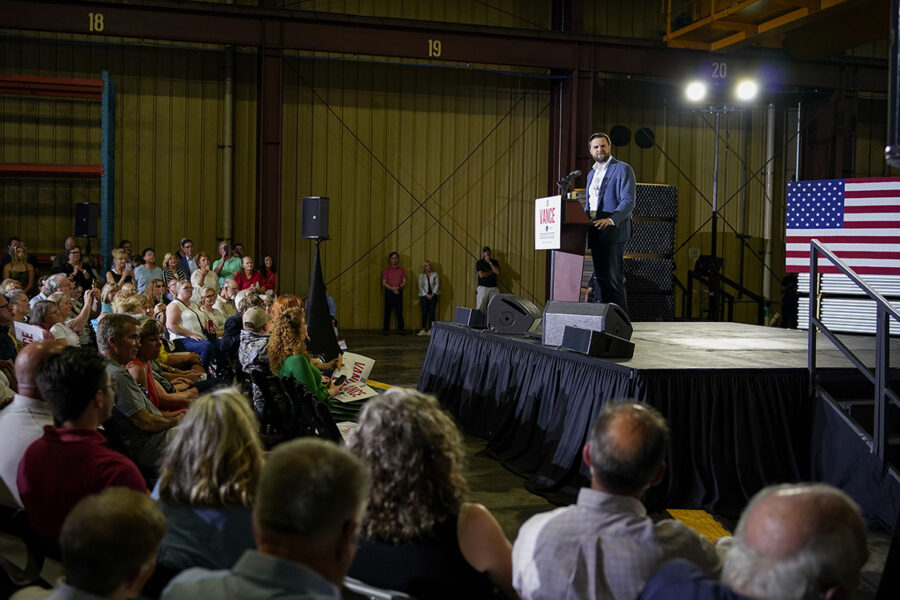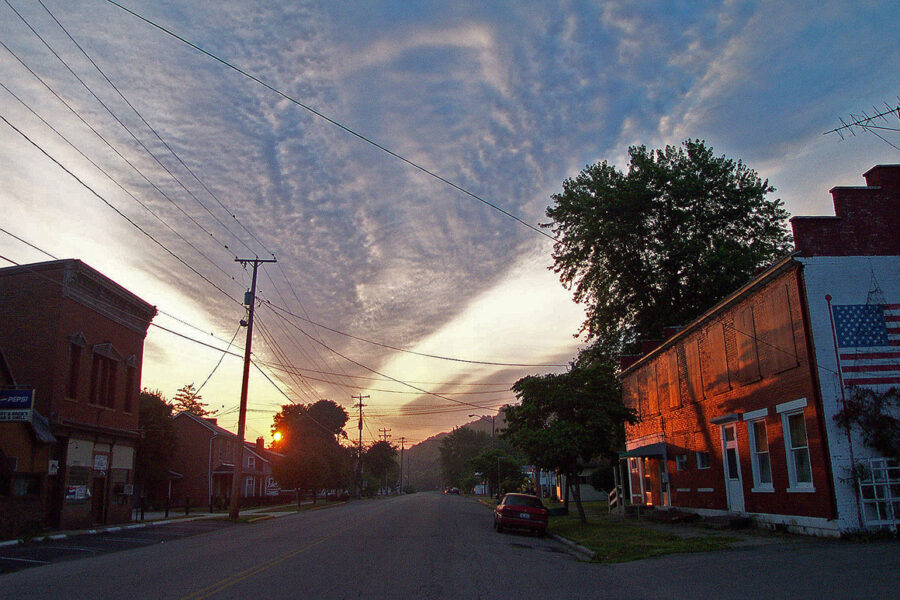The Beltway Can’t Stop Talking About Him. The Voters He Needs Barely Know Him.

LONDON, OHIO—Patrick Closser takes the political temperature most days from his drive-thru window here. The ring-ding sound of another car approaching the little hut at Casey’s Carry Out & Drive Thru for beer, cigarettes, soda or candy is to Closser also a sign of an approaching constituent. Closser owns the place, but he also pulls double duty as the mayor of this town of just over 10,000 residents about 30 minutes outside of Columbus.
“People come through here on a weekend, and I’ll have a cut-off T-shirt on and a backwards ball cap on,” Closser said between orders one day in late July, as he twirled his well-kempt mustache. “I’m a different breed of mayor. I’m not the old guy in a suit all the time.”
For Closser, the drive-thru at Casey’s has become a community bulletin board and straw poll all rolled into one. The local daily newspaper, the Madison Press, folded in 2019, the same year Closser won reelection, and so Closser has embraced a newfound role as beer salesman-cum-dispenser of local information. During his daily shift manning the drive-thru window, he might field questions that run the gamut from “How do I get a construction permit?” to “Can I get a 12-pack of Busch Light?” to “Who’s running in the Senate Republican election?”
But lately, even in deep-red London, there is one question Closser, a Republican, still hasn’t heard all that often at his drive-thru window: “Hey, how about that J.D. Vance?” Of the three frontrunner candidates vying to replace retiring Sen. Rob Portman in the 2022 midterms, Closser says Vance has the lowest profile in London. How much do people in London even know about him? “Not a lot,” said Closser.
The Senate candidates best-known in the area are the frontrunners from past campaigns: Josh Mandel, who is running for Senate for the third time, and Mike Gibbons, whose regular appearances at local events won him the county in the Republican primary in 2018, after Mandel dropped out of the race.
Closser has even seen some news online about the lower-profile Jane Timken, the former state GOP chair who announced a bid earlier this year. But he has yet to hear people talk much about Vance, the bestselling author who grew up in Middletown, just an hour away—and who, according to one poll commissioned by Mandel’s campaign in June, is winning over just 6 percent of likely Ohio primary voters, far behind Timken and Mandel. “It’s just been bits and pieces,” Closser said. “But it’s still early, and [the candidates] are not making the rounds.”
Vance, the author of Hillbilly Elegy, jumped into the Senate race earlier this month. His candidacy attracted a great deal of media attention, in no small part because of his abrupt transformation from Donald Trump skeptic to full-throated Trump endorser. But that has belied a more fundamental challenge, or opportunity, facing the Vance candidacy in its early months: A candidate who built his national brand as a voice of the Appalachian region, and who campaigns as a populist trying to represent salt-of-the-earth Ohio voters, just isn’t all that well-known among those salt-of-the-earth voters yet—at least not as a political candidate.
Taylor Van Kirk, a spokesperson for the Vance campaign, disagreed with that impression. “As a true political outsider, we have been overwhelmed with grassroots support since J.D. got in the race a few short weeks ago,” she wrote in a statement. “Unlike career politicians, J.D.’s voice is authentically aligned with Ohio’s working class.”
But in nearly two dozen conversations with politics watchers and regular voters here before and after Vance officially announced his candidacy, a few did not recognize Vance’s name at all. Most voters, with some prompting, possessed a sometimes-vague knowledge (or loathing) of him as someone they had seen on the news, or whose life story had been made into a movie on Netflix. Almost none knew much about him as a politician, and those Republicans that did had learned about him recently from Fox News or directly from his campaign. And to observers here, that makes his chances at a Senate seat look very different than they might look from Washington.
“I think this is a candidacy that looks really good to the Twitter crowd, and that looks good to folks who aren’t in Ohio and are thinking about the glide path that J.D. Vance has been on,” said David Niven, a political science professor at the University of Cincinnati and former speechwriter for Democratic governor Ted Strickland. “But I don’t know that rank-and-file Ohio Republicans have given him a moment’s thought.”

That may seem paradoxical given Vance’s outsize national profile. Hillbilly Elegy was widely read, and Vance was held up as a sort of anger translator for white working-class Trump voters. It shot to the top of the New York Times and USA Today best seller lists, and it was adapted into a movie, directed by Ron Howard, that was nominated for two Academy Awards. To this day, paperback, audio and e-book versions hold four of the top five best seller spots in Amazon’s “sociology of rural areas” category, and three of the top five in “poverty.”
“[Vance] has advantages coming in with name recognition,” said John Forren, chair of the Department of Justice and Community Studies at Miami University, who teaches in Hamilton, a half-hour down the road from Middletown. But name recognition can only take a candidate so far. “He’s not a blank slate, but he has a lot of room to fill in policy and position details, because people aren’t aware of that yet. They know his story, and it’s an appealing story to a lot of people.”
***
Early public polling—unreliable though it may be—suggests that of the leading Republican candidates, Vance has the amplest room to define himself, a benefit of being a media personality who has up to this point avoided running for anything. A March Public Policy Polling survey of 700 Ohio voters, a little over half of whom said they had voted for Trump in 2020, found that fully 71 percent of respondents simply weren’t sure whether they had a favorable or unfavorable opinion of Vance yet. He scored highest out of the top three candidates on that measure. Sixty-four percent weren’t sure about Timken, compared with 39 percent about Mandel.
Even many attendees at Vance’s own announcement event in early July seemed to be there simply to get to know him. Doug and Tishy Mason—from, coincidentally, Mason, Ohio—arrived at Vance’s event at the Middletown Tube Works, a locally-owned manufacturing plant in Vance’s hometown, without knowing much about Vance. The pair of diehard Trump supporters—Doug, who pours concrete for a living, had even been a sort of Trump evangelist at his job, converting coworkers to the Trump cause—arrived at the rally early, and settled into seats near the stage, behind which had been arranged a big Ohio flag and stacks of gleaming tubes soon headed for furnaces and cars and dishwashers.
“We don’t really know anything about J.D.,” said Doug, as he sat waiting for Vance’s speech to start. “But we like what we’ve heard from him through his book and through his movie, and that’s why we’re giving him a chance. We’ve been disappointed with Portman. More than disappointed.”
Most of Vance’s struggle to define himself with voters like the Masons will largely revolve around defining himself as the Trump candidate in the race—an effort that looked deliberate and painstaking at the rally.
At a lectern adorned with a sign that fell at an awkward point in his announcement, Vance launched into a speech that entwined his Hillbilly Elegy background—proudly declaring that his mother, who struggled with addiction, was now six years sober—with culture war issues and a populist antitrust economic message reminiscent of Sen. Josh Hawley. In one breath Vance bashed critical race theory, and then in the next railed against woke capitalism and called for anti-monopoly measures against big tech, decrying how “whenever we try to complain, when the people in this room try to complain, they’re insulted, they’re put down and they’re called names.”
At the speech’s end, as the loading dock at the tube works grew hot and the crowd of a few hundred fanned themselves with freshly printed “conservative outsider” signs, Vance invoked John Brown, the radical abolitionist raised in Ohio’s Western Reserve. In Vance’s telling, Brown looked out at the rolling mountains of Appalachia as he went to the gallows, and declared the country beautiful. “This is a beautiful country,” said Vance. “Never let them take it away from us. Never stop fighting for it.”
To hear a rousing cry of fight-the-libs from Vance, who once tweeted that he planned to vote for independent candidate Evan McMullin for president in 2016 and achieved success due to his book’s appeal to a largely liberal audience, is a sign of the times in Ohio. Trump won the state by eight points in both 2016 and 2020, and primaries across the state, from the 16th congressional district in Northeast Ohio to the governor’s race to the Senate contest, have become referendums on just how absolute a grip Trumpism, and Trump himself, should have on the state’s Republicans.
“Until we get through the Republican primary, [the Senate race] will be a contest of which candidate best reflects the former president’s agenda, and is viewed as the most loyal lieutenant,” said David Cohen, interim director for the Ray C. Bliss Institute of Applied Politics at the University of Akron.
In that world, Vance’s past criticisms of Trump are a liability, placing him in the uncomfortable position of having to introduce himself and make apologies at the same time. “Vance’s opponents are going to say ‘Look at this hypocrite,’” said Ohio State University political science professor Herb Asher. “If you’re running now as a Trump supporter, then that gets used against you.”
Indeed, after Vance’s announcement, the attacks buzzed in like a swarm of particularly pissed-off hornets. On the day of Vance’s speech, Bill Seitz, the Republican majority leader of the Ohio House, published an editorial in the Cincinnati Enquirer urging readers “Don’t buy what J.D. Vance is selling,” and before the Vance event kicked off, a woman in the crowd showed me text blasts she’d received from an anonymous number, which had gone out to Republicans across the state: “In his own words: ‘I feel out of place in Ohio’; ‘Trump supporters are racist’; ‘Trump is an idiot’; We can’t let this Never-Trumper get anywhere near the US Senate.”
Vance has countered with an apology tour of sorts, scrubbing his old tweets and making the case, often and to anyone who will listen, that though he was at first skeptical of Trump himself, he bought into Trump’s ideology all along, and has since come around on the man too. Meanwhile, a super PAC supporting Vance, financed by $10 million from the tech investor Peter Thiel, has spent six figures on digital ads that emphasize Vance’s criticisms of Democrats and Big Tech, and his Hillbilly Elegy story.
It might be a winning strategy. When I spoke with Doug Mason a few weeks after the Vance announcement, at the tail end of a day he had spent pouring concrete in the rain, he said he had not yet seen any of the news stories about Vance’s past comments. “Trump’s my guy, so hopefully J.D. takes those words back,” he said, after I read him a quote from an apology Vance had given on Fox News. But beyond Vance’s past, Doug had liked that Vance had come off as young and plain-spoken, had taken a pro-religious freedom stance and had tied his pro-life position to the story of his family. Doug still had research to do, he said, and was going to look further into Vance, as well as Timken and Mandel. But he was thinking about volunteering for Vance.
“I liked everything that I heard out of J.D. Vance, everything that he talked about,” said Doug. “That was one of the best political speeches I’ve heard in a long time. He hit on most everything that was important to me, and I agreed with really everything he said.”
***
For the Republican Senate candidates, who, like Vance, have all piggybacked off Trump, Ohio politics watchers have another big question: What does it really mean to be the Trump candidate in a race—the former president’s endorsement, or something else that voters decide?
The day after Vance’s announcement, I drove south from Columbus, where I live, to Pike County, in the southern part of the state. While Middletown might be Appalachian in spirit, I wanted to see how Vance’s appeal, and Trump’s reach, translated somewhere that is Appalachian in geography. As I drove down Route 23, the stretch of road called the Hillbilly Highway, the suburbs gave way to fields, which, after being interrupted briefly by the Greek Revival columns of Chillicothe, Ohio’s first capital, rolled into the beautiful green hills you have heard songs about.
The farther south I went, the more Trump signs I saw: “Keep Trump,” “Trump 2020,” “Trump Pence, Make America Great Again.” They are a common sight in Pike County, which went for Trump by nearly 74 percent last year.

A few decades ago, a number like that in Pike County would have been inconceivable. “I grew up in Pike County. It was so Democrat that, as a little kid, if I just said ‘Republican’, they’d wash my mouth out with soap,” said Diane Carnes, the GOP chairman in nearby Ross County. In 2012, Mitt Romney won Pike County by a single point, and in the same election, voters there sent Democrat Sherrod Brown back to the Senate.
But in recent years, Pike County has gotten 12 points redder, in large part due to Trump, who has sped along rural Ohio voters’ move into the Republican fold, even as college educated and suburban voters trend Democratic. The path to a Republican nomination in Ohio, then, leads through towns in this county like Waverly and Piketon and Buchanan and Bethel, places where, if Vance can prove his Trump bona fides, his story could resonate. “We might lean toward Vance here, I think,” said Carnes. “But there’s not so much talk about it. We are concerned about tomorrow, what [election] is coming up next?”
That “up next” election will be taking place on those picturesque fields I had driven through to get to Pike County: Ohio’s 15th congressional district. A special election to replace Rep. Steve Stivers in the safe Republican district is rapidly approaching this August, and will be an early test of many of the same factors at play in the Senate primary next year, in which all of the candidates are jockeying for Trump’s favor.
Like the Senate primary, in which more than 10 candidates have either declared or expressed interest, the field in the 15th district primary is wide open, with 11 candidates on the ballot. Mike Carey, a coal industry lobbyist, has received the former president’s imprimatur, while Jeff LaRe, a former law enforcement officer, has received Stivers’ endorsement. Bob Peterson, an Ohio state senator and farmer, has also mounted a potent dark horse campaign, hoovering up over 100 endorsements from local officials and several county parties. When Republican voters go to the ballot box in the 15th district on Aug. 3, they will answer a key question: Just how much weight does Trump’s endorsement still carry in Ohio? In a low-turnout race that’s attracted little attention, is Trump’s blessing enough to boost a relative unknown past a whole posse of well-organized opponents?
In the long run, however, emulating Trump’s style might be just as important as gaining his endorsement. On his porch in a verdant Pike County valley, bird watching binoculars close at hand, Tony Montgomery, a county commissioner, said that in his part of the state, just south of the 15th, primary voters are looking for a Senate candidate in Trump’s image, whoever that might end up being. A lifelong businessperson, Montgomery, whose family hails from Magoffin County, Ky., was swept into office in 2016, beating a four-time incumbent by 900 votes. Trump’s combative style, he said, was a key to his success in Pike County, and Republican voters there are looking for candidates who embody it. “I don’t think you can be as big a personality as Trump was, he said. “But that style appeals to a big population of people.”
In 2018, Montgomery had thought that candidate was Josh Mandel, before Mandel, to Montgomery’s disappointment, pulled out of the race, citing his wife’s health issues. This time around, Montgomery was still undecided. He didn’t know much about Vance, other than an article or two he’d read. But from what he’s seen, Vance’s Appalachian roots sounded appealing, and Montgomery wanted to know more.
“I probably need to read this dude’s book,” Montgomery said, as he shucked corn for a July Fourth weekend supper, ripping off rotten ends and throwing them over the porch railing for his dogs to play with. “Definitely, we’ll be doing some more research on him.”
Go To Source
Author: POLITICO

